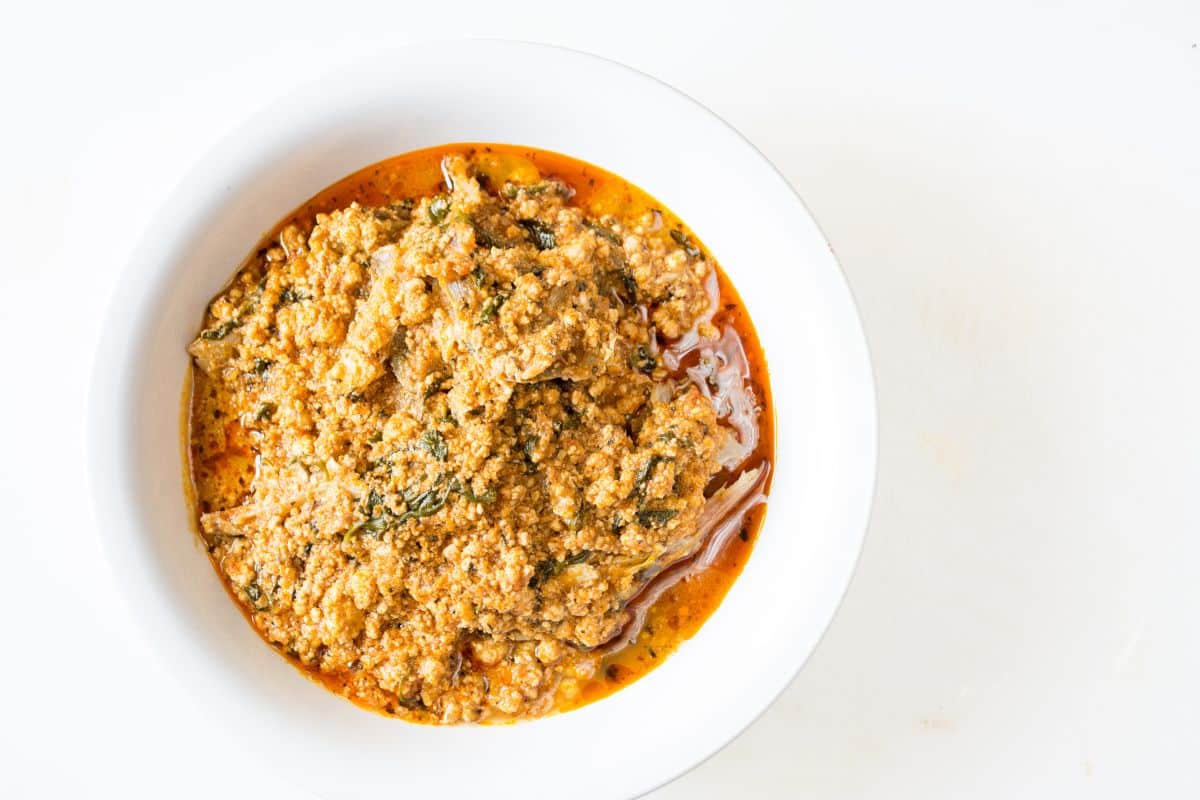Within world cuisine, there are many variations of nuts and seeds that are utilized for numerous different purposes – with one of the most popular being egusi.

But what exactly is egusi, and what does it actually taste like?
What Is Egusi?
Egusi are the seeds taken from certain cucurbitaceous plants – namely squash, gourds, and melons – and are used in numerous different dishes throughout the world, especially western Africa where they are a widely used delicacy.
Rich in protein, and a healthy part of anyone’s diet, egusi melon seeds are large, flat, and white – with some less common variations in shades of brown.
As such, they can sometimes be confused with pumpkin seeds – a confusion that can be corrected when they are tasted, as the two possess completely different flavors.
What Is The Purpose Of Egusi Seeds?
Within cooking, egusi seeds are both used as a means of enhancing the natural flavors in various meals, as well as a thickening agent within cooking.
This is because the texture of the seeds really lends itself to the thickening process – something that can be useful for creating various pastes and mixtures used in cooking.
What Do Egusi Seeds Taste Like?
Generally speaking, egusi is considered to taste nutty, earthy, and flavorful – comparable to umami, which is one of the five basic flavor categories within traditional Japanese cooking.
This is generally considered to be a savory flavor, as one might expect from seeds, albeit with a richness and complexity that really lends itself to numerous dishes.
As a rule, the seeds themselves have a certain bitterness to them when they are raw – and as such are not considered as good in this state – however, once they have been cooked, they develop a much nicer flavor, composed of a slightly sweet, slightly salty taste that can be great for enhancing or contrasting with existing flavors in dishes.
Do Egusi Seeds Taste Nice?
This is obviously a matter for personal preference, however, as mentioned above, we can confidently say that, while they are considered somewhat less appetizing when they are raw, their cooked state is considered to be highly desirable – something that explains why they are so readily used in numerous dishes within Western Africa and further afield.
This would obviously suggest that, to some degree, they are considered to taste nice to many people.
What Are Egusi Seeds Used For?
While they can be used for all manner of different meals, their main uses within West African cuisine is in stews and soups – where the sweetened, salty flavor can really help to enhance the other flavors therein.
Egusi Soup
This is the most common, and generally consists of egusi seeds, mixed spices, meat, fish, and various forms of vegetables.
This is not only considered a tasty meal in African cuisine, but it is also considered pretty healthy and nutritious – with the seeds themselves being great sources of protein.
Are Egusi Seeds Healthy?
Egusi seeds are also considered to be healthy – something that, as mentioned previously, is due to their high protein content.
However, there are numerous other benefits that they are known to bring to the table.
Anti-Inflammatory Properties
Like many seeds, egusi seeds have a compound within them that has been shown to be good for lessening inflammation – something that can be beneficial for numerous chronic illnesses and conditions, including arthritis and fibromyalgia.
Prevent Diabetes

The seeds themselves are also thought to help prevent the onset of diabetes.
This is the same with most forms of seeds, which are shown to lessen the spikes caused by sugars and carbohydrates.
By lessening the spikes in our blood sugar levels, this helps to promote proper function of our systems, and helps to stave off type 2 diabetes, and the other problems that usually follow.
Lowers Lipid Levels
Lipids are the fats that can often be found in our blood, and egusi seeds have been shown to lower the volume of these fats – something that can be good for those suffering from high cholesterol and other conditions.
This can eventually help to stave off things like heart attacks, chest pains, and other problems that can arise from fat in our blood and arteries.
Prevents Bacterial Infections
Egusi seeds have also been shown to help with the prevention of bacterial infections – namely because the fruit itself (and the components therein) are rich in chemicals that kill bacteria (including Escherichia Coli).
This makes the extract of the fruit, and the implementation of seeds into the diet, natural and effective forms of antibiotics.
Source Of Antioxidants
Egusi seeds are also considered to be a great source of antioxidants – something that can help offset various conditions, and even slow down the aging process in general.
Aging is caused by cells becoming oxidized, and as such, by introducing foods like egusi seeds into our diets, we can help to offset these signs of natural aging and stay looking younger for longer.
Antioxidants are also good for neutralizing free radicals – which are responsible for rheumatoid conditions, heart disease, and forms of cancer. As such, these can be a vital addition to any diet.
Stimulate Hair Growth
They are also thought to be good for stimulating hair growth – namely due to the fact that the seeds have been shown to increase the number of hairs in animal studies.
While this process is a long way from human trials, it does hold some promise for those who suffer from hair loss, and problems closely related to hair thinning.
Final Thoughts
And there we have it, everything you need to know about egusi, and what exactly it tastes like.
It’s certainly true that egusi is a versatile and delicious seed – one that is popular throughout Africa and the wider world too – that has numerous uses and applications for numerous meals.
So if you are looking for a new source of protein, then why not give egusi a try? Something tells me you won’t be disappointed!
Frequently Asked Questions
Now that we know a little more about egusi, and what exactly it tastes like, we will now answer some frequently asked questions that you might be interested in.
While you might not locate egusi in your local, rural grocery store, you can certainly purchase it online, and in various health food stores.
Depending on where you go, egusi is quite affordable – as with any seeds – however it might be more expensive in upmarket food stores.






